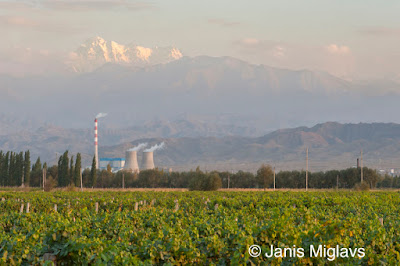How would you have fed the 10,000 soldiers needed to man the 13,000 miles of Great Wall 2000 years ago? And how would you feed all of your soldiers out there conquering new territories?
Frustrated by the futility of long supply lines, the Chinese emperors and generals developed the idea of soldier farmers. These guys would be warriors and at the same time know how to grow their own food.
Supply line problem solved.
Now it looks as if the Chinese government looked to history to help solve a current problem.
Quite by accident, on my visit to the Citic Guoan winery vineyards way out west in Xinjiang, I found that the Chinese government has resurrected the 2000-year-old eat and conquer concept.
 |
| A tractor pulling a wagon passes some housing built for Han soldier-farmers near Fukang, in the Xinjiang Uygur Autonomous Region, northern Xinjiang Province, People's Republic of China. |
To deal with the restless Uyghur population, some of who blow up buildings and people, the government has sent an army of Han (the dominant ethnic population in China) out west.
During the summer months these imported men and their families work the fields, including the vineyards. When the cold months come, they train as soldiers. For the government, this instantly solves two problems: provide workers for the labor shortage out in the west and have a standing army ready to battle insurgents.
 |
| A worker prunes Chardonnay vines, preparing them so they can be buried during the frigid vine-killing winter on agricultural land managed by the 222 Unit of China's Xinjiang Production and Construction Corps, known as XPCC, the PCC or Bingtuan for short, a unique economic and semi-military governmental organization in the Xinjiang Uyghur Autonomous Region). The grapes are used by Citic Guoan Winery. |
Entire towns are built for these Han soldier-farmers.
 |
| This castle-like building houses the kindergarten classrooms on a "bingtuan," military-run farm. China, Xinjiang Province, Xinjiang Uyghur Autonomous Region, Changji Hui Autonomous Prefecture. |
 |
| Housing for the Han Chinese settlers on a "bingtuan," military-run farm near Fukang, Changji Hui Autonomous Prefecture, Xinjiang Uygur Autonomous Region, northern Xinjiang Province, China. |
 |
| Citic Guoan Winery gets Cabernet Sauvignon grapes from this vineyard sitting in front of a nuclear power plant and Bogda Peak in the Tian Shan Mountain range. Xinjiang Uygur Autonomous Region, China. |
Please respect that all images are copyrighted
© Janis Miglavs 2015
janis@jmiglavs.com



No comments:
Post a Comment